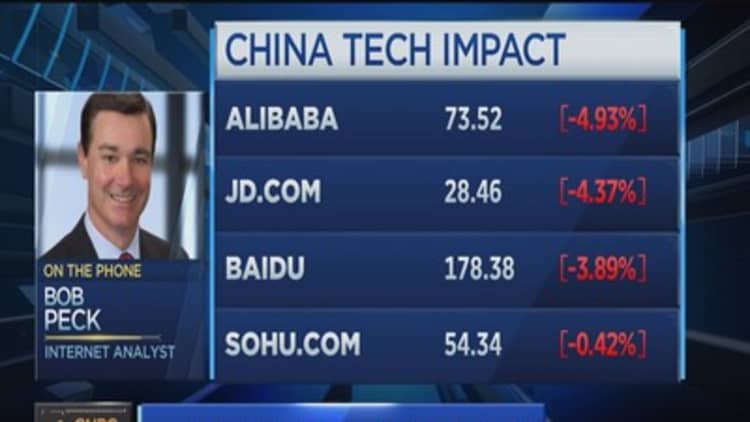Chinese technology companies that trade on U.S. exchanges have been so beaten down that many are trying to go private so they can potentially relist at home. That makes Friday's debut of China Online Education Group all the more unusual.
The Beijing-based company, which provides English online training for people in China, sold 2.4 million American depositary shares at $19 apiece, for a market capitalization of close to $400 million. The stock fell 2 cents on its first day of trading on the New York Stock Exchange.
COE is diving into the public market at a time when U.S. companies are steering clear. There hasn't been a domestic venture-backed tech IPO all year, and software developer Twilio's IPO filing last month is among the only indications that activity is on the horizon.
So why take the risk?
"When you're talking about teaching English, being listed on the NYSE actually helps the brand quite a bit," said Hurst Lin, the head of DCM China, COE's largest shareholder. "It's not about raising cash, it's more about raising awareness."

The company, which is also backed by Sequoia Capital's China fund, is certainly small by the current standards for an IPO. First-quarter revenue more than doubled to $11.2 million, which is less than the $14.6 million COE spent on sales and marketing.
The sales and marketing staff increased to 1,936 at the end of the first quarter from 736 in December 2014. Costs are tied to telemarketing, free trial lessons, mobile marketing and branding, according to the company's prospectus.
COE's desire to trade in the U.S. is in direct contrast to many of its Chinese tech peers.
About three dozen Chinese-listed companies received offers to go private last year, according to FactSet, but only five of them were completed. The purpose of delisting, for the most part, would be to relist in China, where internet companies are commanding much higher prices relative to sales.
Among the companies trying that tactic are dating app Momo, e-commerce site Dangdang, social platform YY and data center services provider 21Vianet. Each has tumbled at least 20 percent in the past year.
Chinese internet stocks in U.S.
China's regulators have thwarted these efforts on concern that the companies are trying to use shell businesses in China to effectively create reverse mergers and avoid the lengthy process of going public.
"The Chinese government is a little bit concerned about so many companies doing backdoor listings," said Lin. Regulators are saying, "It sounds like a great idea, but not really," he said.
In COE's preparation to go public, the company met with investors in Hong Kong and then traveled to the U.S. for meetings in New York, Boston, Chicago and San Francisco. Jimmy Lai, the company's chief financial officer, said they had 46 one-on-one investor sessions.
Lai said the investors most interested in the story were those "looking for disruptive forces in education."


